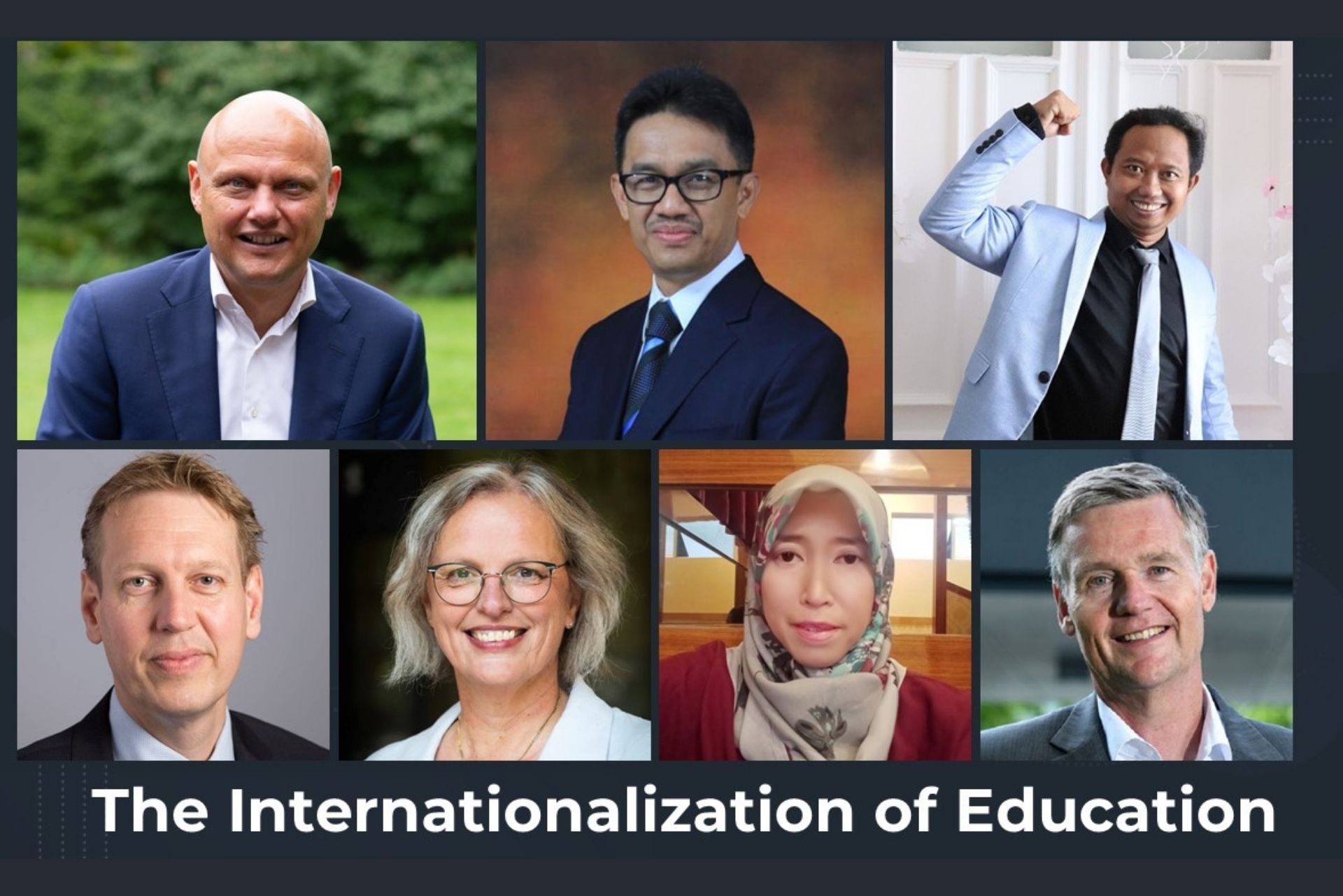Future Indonesian-Dutch cooperation on education and research should involve industry and society
Photo caption: Moderators & Speakers on session : Internationalization of education, 28 October 2021 – 1st row, right to left : Mervin Bakker | Aris Junaidi | Al Makin – 2nd row, right to left : Gerbert Kunst | Titia Bredée | Salamah Agung | Tom Veldkamp
How can Indonesia and the Netherlands build onto the strong foundations of collaboration in the field of education and research? During the final day of the second WINNER conference (Week of Indonesia-Netherlands Education and Research), high-level panelists outlined the direction: collaboration with private parties and thematically embedded scholarship programmes were among the ideas put forward.
After many interesting sessions on topics ranging from tuberculosis control to sustainable tourism, the final day of the WINNER conference offered a broader overview of collaboration between Indonesia and the Netherlands. The objective was to identify achievements and explore directions of future partnerships, linking them to sustainable development goals (SDGs).
Entering the world top 500
The Indonesian Ministry of Education, Culture, Research and Technology, is extremely ambitious, as became clear during the conference. Aris Junaidi, Director of Learning and Students Affair Directorate General of Higher Education, Research and Technology, pointed out that Indonesia aims to enter 3 or 4 Indonesian universities in the world top 500 yearly. With 9 million students, the scale of higher education in Indonesia is quite different from the Netherlands (800.000 students). However, Aris Junaidi sees many opportunities for bilateral cooperation for the 5600 higher education institutions in Indonesia. “Internationalization one of our priorities. Moreover, the flexible learning opportunities as formulated in ‘Kampus Merdeka’ could include also international exchange”, Aris Junaidi said.
Gerbert Kunst, Director of International Policy at the Ministry of Education, Culture and Science, the Netherlands, underlined the strategic importance of knowledge diplomacy. “Cooperation with Indonesia is highly valued in the Netherlands, it was recently reiterated by the Dutch Parliament”, Kunst said. “We should build on the strong relations that are already in place.” The ‘triple helix model’ (interaction between academia, industry and government) offers direction for future cooperation, Kunst added. “Sustainable Development Goals are about including societies.” Learning from best practices and sharing the impact of the research through open access publications are of great importance in attaining the SDGs.
More balance in student exchange
In the search for global talent, students move everywhere. Yearly some 2400 Indonesian students come to the Netherlands; the other way round not so many Dutch students take their chance in Indonesia. Titia Bredée, Director-General at Nuffic, the Dutch organisation for internationalization in education in The Hague, therefore underlined that countries should keep investing in the knowledge infrastructure so that cooperation is long-term. “We should work on removing the obstacles for Dutch students to move to Indonesia.” Bredée also wanted to investigate the idea of setting up a new PhD-scholarship-programme for both countries.
Degree collaboration and co-authoring
Universities also took part in the WINNER conference, with Prof. Al Makin, Rector of UIN Sunan Kalijaga, focusing on the importance of not only maintaining, but also strengthening the relation, the friendship and the collaboration with the Netherlands. Specifically Al Makin would like to achieve degree collaboration between UIN Sunan Kalijaga and Dutch counterparts and increase the number of co-authored articles. “We could also investigate merging our funding, achieving collaboration between Indonesian and Dutch researchers who both bring their own funding”, he said.
Prof. Tom Veldkamp, Rector of the University of Twente, elaborated on the nature of future collaboration. “Apart from the obvious exchange of students, we should think of joint scholarship programmes, preferably on thematic issues. PhD-students often work very isolated, it is of great importance that we create structures in which these PhD-candidates can work together.” Veldkamp also underlined the significance of public-private partnerships. When industry is involved in research programmes, it guarantees a broader impact on society. “We should not only aim for international collaboration, but also public-private collaboration.”




